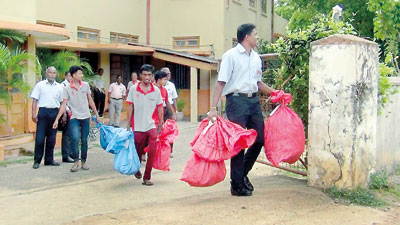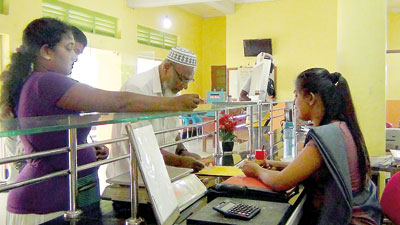News
Mail services back to normal, but postal unions deliver fresh warning
Although the postal unions’16-day island-wide strike has temporarily come to an end, issues faced by the Postal Department are far from resolved, with unions threatening to resume the strike after July 7 if the authorities fail to meet their demands.

Puttalam main post office: Accumulated mail on its way for distribution. Pix by Hiran Priyankara Jayasinghe
The unions say they are awaiting a positive outcome from the ongoing talks between the National Salaries and Cadre Commission (NSCC) and union representatives.
The talks that began yesterday will continue until agreement is reached on their demands before Friday. The unions warn that if they are not satisfied with the outcome, they would resume their island-wide strike action.
“We ended our strike temporarily, but we may have to resume it if these longstanding issues are not resolved at the talks,” United Postal Trade Union Alliance (UPTUA) Convenor Chinthaka Bandara said.
He said the workers returned to work on Wednesday with the intention of carrying out a work-to-rule campaign, meaning they would refrain from working overtime.
However, given the massive backlog of mail and parcels that had to be cleared, this action was suspended effective from Thursday noon.
Mr Bandara claimed workers were able to clear much of the backlog by Friday.
While the backlog was mostly cleared, some 5 million letters and parcels were received for Colombo alone on Thursday, as people and institutions again started sending mail via post. Sorting and clearing out so much mail could take several more days, the workers noted.
Meanwhile, Postal Department sources disclosed that clearing of airmail and packages at the Bandaranaike International Airport (BIA) was still ongoing.
As the postal services which had remained virtually paralysed for more than two weeks are seen to be now finally up and running, Postmaster General Rohana Abeyratne told the Sunday Times that the department moved swiftly into action from midnight on Tuesday. “We already had a system in place and as soon as the workers returned, we were quickly able to resume work on clearing the backlog,” he said.
While the Postal Department had been “severely impacted” by the 16-day strike, the total financial loss the department suffered was still being worked out, Mr Abeyratne said.

It's back to work at the Puttalam post office, but for how long?
The main demand of the unions is to convert the Postal Service to a ‘Closed Service,’ which would enable the department to independently decide salaries and matters relating to recruitment. Unions say this is the best solution to issues created by Circular 6/2006 pertaining to salaries of all government departments. Postal Department employees point out that the circular has had a severe negative impact on their promotions and other benefits.
While much will depend on the outcome of discussions with the NSCC, a dispute is brewing over the unions’ fresh demand that workers who took part in the TU action be paid their entire salary for June. Earlier, the Postmaster General had declared that only employees who report to work will be paid their June salaries in full, while the strikers would be paid only for the work done from June 1 to 11.
Postal Services Minister M.H. Abdul Haleem said that this had created a legal and procedural problem, since the Department had already decided not to pay the salaries in full to the strikers who ignored the June 18 deadline to report to work.
“Even after the announcement was made, they continued the strike for seven more days. This was even after we accepted their demands. As such, if we are to pay their full salaries, I may have to put a Cabinet Paper and seek approval,” he added.
Postal Union Convenor Bandara, however, insisted that the June salary issue was non-negotiable. He said that at no time in the country’s recent history, had striking workers been penalised by not paying their salaries. He said there had been recent instances where university non-academic staff and labour officers, who struck work for far longer periods, were paid their entire salaries.
Moreover, the move would also open the employees up for disciplinary action as the days workers did not report for duty would be registered as them having taken ‘No Pay’ leave, he said. “If they deduct the salaries of Postal Department employees, it will set a bad precedent where authorities can punish employees for taking TU action. We will not stand for that.”
Meanwhile, with postal services returning to normal pending a final solution, the disruption caused by the strike to public services has mostly ended.
As a result of the strike, the Education Ministry was forced to extend the closing date for Grade 1 applications from June 30 to July 10.
The Department of Examinations permitted applicants to sit for exams without admission forms usually sent by Registered Post. The department sent out text messages to the candidates’ phones, giving the exam date, time and venue.
Exams Commissioner Sanath Pujitha said candidates showed the SMS on their phones to examination supervisors and gained entry to the exam halls. Six such exams were successfully held during the strike period.
Mr Pujitha said that there were no major problems as the exams that were held during the strike period had only a few candidates. A far bigger examination, the First Efficiency Bar Examination for Development Officers was held yesterday at 129 examination centres island-wide, with some 18,800 candidates sitting this exam.
Since none of them had received their admission cards because of the postal strike, the Examinations Department uploaded the admission cards to its website and by Thursday 17, 831 candidates had already downloaded them .
Divisional Secretariat officials, who stepped in to carry out certain postal services duties were also relieved. They attended to extra duties by accepting traffic fines and paying pensions and old-age allowances.
Officials of the Colombo Magistrate’s Court, which like most major courts, had been severely impacted by the strike, said the situation had returned to normal by Friday, with summonses that were stuck in post offices being delivered.

